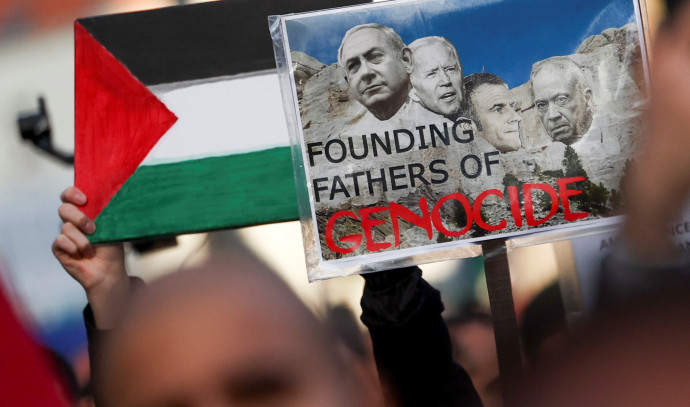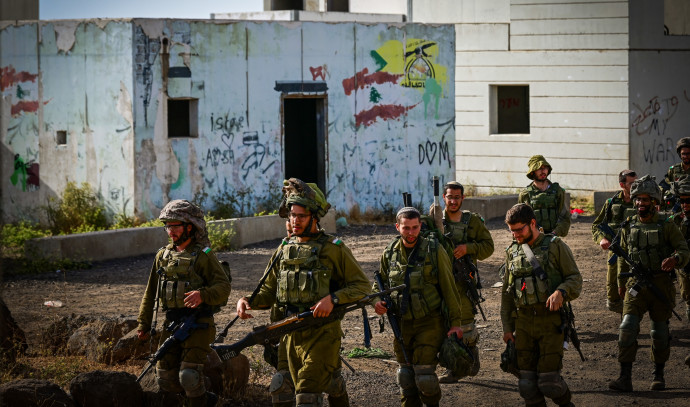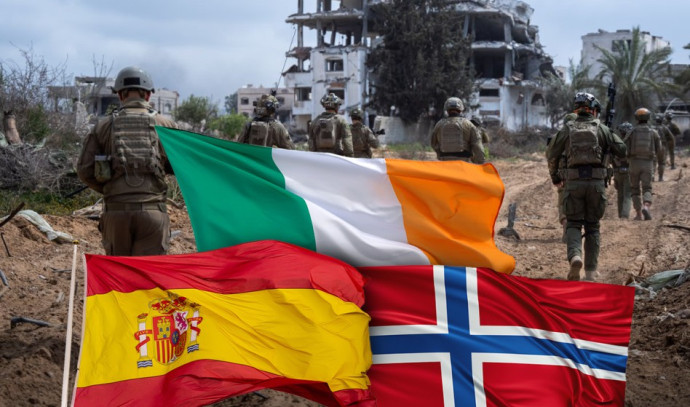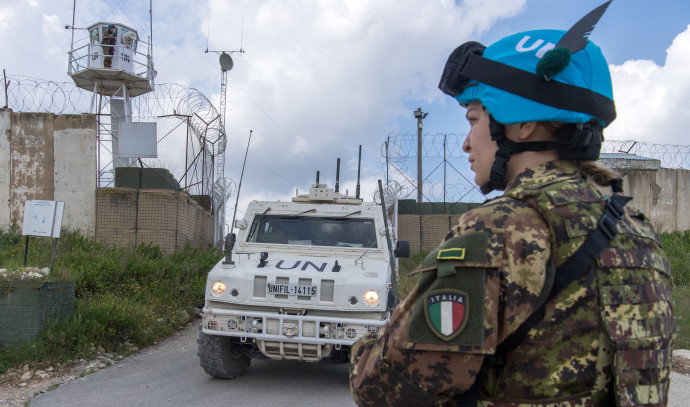world news
Biden, Netanyahu walk political tightrope in Israel’s war with Hamas

As Israel’s offensive against Gaza continues, there is increasing US pressure on Israel to ensure fewer civilian casualties in the fighting and agree to a humanitarian pause that would also possibly enable the release of 239 hostages, most of them Israelis.
“The United States does not want to see firefights in hospitals where innocent people, patients receiving medical care, are caught in the crossfire. And we’ve had active consultations with the Israel Defense Forces on this,” Sullivan said.
The war began five weeks ago with a surprise offensive by the Hamas terrorist organization in which approximately 1,200 Israelis were killed and thousands more were wounded. Since then, the total number of Israelis killed has risen to around 1,280, and the number of wounded stands at about 7,300. According to the Health Ministry of the Hamas-run government in Gaza, 11,180 Palestinians have been killed and 28,200 have been injured.
Is Biden getting impatient with Netanyahu?
Last week, President Biden already indicated he was getting impatient with Prime Minister Benjamin Netanyahu. He told reporters that “it’s taken a little longer than [he] had hoped” to persuade Netanyahu to agree to a humanitarian pause that was more than a few hours. For now, the Israeli military has been giving Gaza residents safe passage to the southern part of the territory for four hours a day, during which they are guaranteed there is no fire in those areas.
Netanyahu has repeatedly said there will be no ceasefire without the release of hostages. There have been reports of negotiations progressing towards a deal with Hamas on their release, however, there has not been any official confirmation or announcement.
When the war broke out, the US administration was quick to adopt a very pro-Israeli stance. President Biden arrived in Israel as the country was still in a whirlwind of shock at the magnitude of Hamas’ attack. The US leader vowed to support Israel with funding, military aid, and diplomatic support as the Jewish State pledged to topple Hamas’ rule in the Gaza Strip.
As time goes by and the death toll in Gaza mounts, so does internal pressure on the US president.
What polls say about Americans’ support for Israel, Biden and the war in Gaza
According to several polls conducted in the US in recent days, nearly half of the Democratic Party disapproves of the Democratic president’s handling of the war. President Biden finds himself managing a delicate balancing act. He is caught between the support he has promised Israel, one which he appears personally invested in maintaining through his heartfelt speeches and allocation of unprecedented military aid and funds, and his political interests which may clash with that support.
President Biden faces a reelection campaign in just under a year but now with negative poll numbers.
“Within the Democratic Party, especially those under 45 years old, there is a significant drop in support for Biden’s pro-Israel stance,” said Alon Pinkas, who served as Israel’s former consul general in New York as well as a policy adviser for former Israeli Prime Minister Ehud Barak and political adviser to the late Israeli President Shimon Peres. “For now, this doesn’t have an impact on his actions, because the election is still a year away. But this has an accumulative effect, and there are enough political advisers already telling him he has a very short time to change the dynamic,” Pinkas told The Media Line.
President Biden faces increasing opposition from the progressive wing of his own Democratic Party. Progressive democrats have been vocal opponents of the pro-Israeli stance that the White House has chosen.
“In the past, it was believed that in order to win an election, the candidate needs to move to the center,” said Prof. Menahem Blondheim, an expert in American history from the College of Management and the Hebrew University of Jerusalem. “The last election campaigns proved otherwise, that the fringes have become increasingly important both for Republicans and Democrats,” he told The Media Line.
According to Blondheim, this time the number of undecided voters that will likely call the vote are largely in the center, holding a position against Hamas and in favor of Israel.
“The progressives are on the opposite of this trend, and Biden will have no choice but to differentiate himself from them,” Blondheim told The Media Line. “Aligning himself with the progressives will be very problematic for Biden.”
Both the Israeli prime minister and the American president had a tumultuous year. When Netanyahu took office for his sixth term late last year, he began the promotion of a contentious judicial reform that put him at odds with the White House. It was perhaps the lowest point of the Israeli-US relationship, which has since been forgotten with the steadfast support of President Biden in the wake of the Hamas attack.
But Netanyahu now again seems to be adopting a contrarian position, shooting down any room for compromise.
With the US president looking at his domestic situation, there could be a point where he will reconsider his policy.
“Israel is making it easier for Biden because it has been refusing any idea or proposal by the US,” Pinkas said. “This includes the call for humanitarian pauses, local ceasefires, and also the idea of a multinational force that would include the Palestinian Authority to control Gaza after Hamas. They have also asked Israel to try and de-escalate the tensions with Hezbollah in Lebanon, and this is also not happening.
“Not everything is Israel’s fault though. But gradually, there is a greater gap between the American and Israeli interests,” Pinkas added.
Netanyahu is also walking a tightrope. His favorability among the Israeli public is plummeting. Viewed by many as responsible for Hamas’ strengthening and for the blunder that led to the surprise offensive by the terrorist organization, Netanyahu is the target of intense criticism. The response by his government to the plight of tens of thousands of displaced Israelis, the perceived weak response to Hezbollah provocations on Israel’s northern borders, and his appearance as indifferent to the suffering of the victims as he postponed meeting relatives of those killed and kidnapped have all contributed to his political slump.
Days into the war, Netanyahu was forced to listen to calls to form an emergency government that would include elements of the opposition. Benny Gantz, a former defense minister and prominent member of the opposition to Netanyahu, agreed to enter the government and join a newly formed war cabinet. Also, with him came other members of the opposition, including former military Chief of Staff Gadi Eisenkot.
Netanyahu now finds himself in a minority in the war cabinet, a minority that could stop him from further pushing back on US requests.
“If Netanyahu will widen the rift with the US out of his political survival interests, it could very well be that other members of the cabinet will stop him,” said Pinkas.
The White House is well aware of Netanyahu’s precarious political position in Israel.
“Biden understands that Netanyahu may have run his course and could become a lame duck politically,” said Blondheim. “This could give Biden the power to support Israel while still showing token resistance to Netanyahu’s policies.”
For both leaders, it is a lot, if not all, about optics.
In 1992, one of the campaign slogans of former President Bill Clinton was “It’s the economy, stupid.” In the wake of US involvement in the war in Iraq and the following recession, public opinion turned sharply on then-President George H.W. Bush. Clinton’s advisers understood then what is often viewed now as a commonality. Americans do not vote on foreign affairs but rather on the state of their economy.
But Israel appears to be the exception.
Netanyahu will be needing more of the American president’s support
“It is more of an emotional issue,” Blondheim explained. “There is a deeper bond, based on shared values and commonalities between religions that makes Israel more of a domestic issue rather than one of foreign affairs.
Also, Blondheim adds, the Jewish population in the US still has a decisive voice in the political arena. Jews make up the largest religious minority in the US and have a traditionally high presence in domestic politics.
As the fighting goes on, Netanyahu will be needing more of the American president’s support and not less of it.
President Biden, who has signaled that he is losing patience with Netanyahu’s lack of willingness to compromise, has many options to strong-arm Israel.
The US has guaranteed to continuously replenish Israel’s supply of air-defense rockets, a critical component of Israel’s defense against Hamas and Hezbollah. The US has also mobilized forces and aircraft carriers to the region along with approving a massive $14 billion military aid package to Israel. These are in addition to the annual aid already granted to the Jewish state.
“Israel’s dependency on the US ranges from great to absolute,” said Pinkas. “If Israel continues to say no after everything the US has done for it since the beginning of the war, we could see them take action.”
world news
Eyeing Iraq and Syra, the IDF is preparing to fight in Lebanon – analysis

The cherry season is at its peak but there is little traffic in the orchards and the fruits are rotting on the branches.
Israelis, unlike every year, are avoiding a pilgrimage north to the self-harvesting orchards in Odem, Merom Golan, Kela, and Elrom. The winds of war gripped the Golan Heights this week with intensity.
Dozens of forest and pasture fires broke out in the northern plateau near Katzrin and up to the western slopes above Kibbutz Gadot.
Hezbollah has been hit in recent weeks by IDF operations. Their desire to respond, to take revenge burns inside them.Therefore, they chose to increase the range of fire for military targets in the Golan Heights. This is how Hezbollah broadcasts that it is looking for revenge in addition to preparing the fighting space for the day when Israel will make a significant move in Lebanon.
Under new management
A month and a half ago, Col. Benny Kata assumed the position of commander of the 474th Brigade, the brigade that defends the Golan Heights area.
Ostensibly, he should have turned his attention to the east, towards Syria and even deeper into Iraq, but already in the process of taking over the role, he realized that he must also be ready for missiles and UAVs also from the northern theater in Lebanon.
In the weeks he has been in office, almost every day, Hezbollah fired rockets or launched anti-aircraft missiles into the Golan Heights from Lebanon.
80 percent of the forces in the Golan Heights are combat-reserve units. The previous times that the reserve army was in the Golan Heights in such numbers were during the Yom Kippur War and both the first and second Lebanon Wars.
The eastern border with Syria is a fake border. On the one hand, the Separation of Forces Agreement was maintained even during the civil war in Syria during the Arab Spring.
UNDOF forces, entrusted with maintaining the armistice agreement and the separation of forces, act with respectable assertiveness, unlike the UNIFIL forces on the Lebanese border. On the other hand, beneath the false silence, unrest is taking place. Even binoculars for viewing from a distance will not reveal what is taking place.
The Iranians managed to take control of considerable areas in Syria during the days of the civil war.
They sacrificed their lives to save the rule of Assad Jr.
Thousands of Shiite Iranians migrated from northern and western Iran to Syria. In the world media, they are called “pro-Iranian militias”. In practice, they are Iranian fighters under the operation of the Quds Force of the Islamic Revolutionary Guards.
“The Iranian proxy was in our eastern arena. We know what the capabilities of Iran and Hezbollah are, and they exist among these militias in Syria and in Iraq as well,” said one military official.
This is the reason why Col. Benny Kata and his soldiers work around the clock. On the one hand, the IDF is improving readiness in the Golan Heights, through more training and improving the means for both attacks and warning, as well as improving the line of fortifications and carrying out engineering operations.
The IDF says that the goal is to damage the capabilities of the Iranian militias deep in Syria and even in Iraq. To this end, the army was deployed not only on the Israeli side of the border but also in the security area, which is a section of hundreds of meters, defined as Israeli territory, but it is east of the perimeter fence.
According to foreign publications, the IDF operates every few days in much deeper ranges, both in the outskirts of Damascus, Homs, Quneitra and more.
“We are not evacuating the residents of the Golan. Our defense activity is in the space beyond the fence,” says a military official. But in the 747th division, they don’t take any risks after October 7.
Along with the offensive defense plans, they are strengthening rear defense systems, including refreshing and strengthening all the standby classes in the settlements. The IDF increased the classes, trained the fighters, and even provided combat equipment that would allow dealing with forces’ infiltration into the Golan Heights area.
The decision on whether to go for a ground maneuver in Lebanon may be made at the political level soon.
This is, of course, if we judge by the level of statements and threats heard in recent days. The IDF understands that such a move will open at least one more fighting front in the Golan.
world news
Why does Europe recognize a Palestinian state separate from Israel?

Spain, Ireland, and Norway’s recognition of a Palestinian state is perceived in Israel as a product of antisemitism and an anti-Israel stance in the Israeli-Palestinian conflict. However, it is not necessarily, certainly not exclusively, related to these positions. This step can also be seen as a European ideal to change the course of history and to reinforce Europe’s influence in the Middle East.
Politics are driven by power and control. These concepts are not only achieved through military force but can also be implemented through the dissemination of cultural and political ideas. Starting from the mid-19th century until its end, Europe experienced a national awakening. Within this context, Christian Europe shaped the idea of the nation-state. Europe did not think then about nations outside itself, but some of them had already begun to think about themselves. This happened in Asia, the Americas, and even in Africa. The Jews, in their own way, quickly adopted the new idea and created Zionism.
In contrast, the Muslim world never fully embraced this political organization. This is particularly true among Arabs in the Middle East. The adoption of the nation-state idea in territories like Egypt, Iraq, Jordan, Syria, and Lebanon is still partial and territorial to this day and is explicitly a product of European colonialism. At some point, Muslim Arabs understood that in order to break free from European colonial rule, they needed to learn to speak their language and establish organizations that would be legitimate in their eyes, and quickly created national resistance movements against European colonialism.
These movements have over time transformed into nation-states. Yet from the authentic consciousness of the Arabs in the region, the concept of nationalism is still a foreign concept. It is no coincidence that Arab-Muslim nation-states in the Middle East remain weak and fragile to this day, with some of them undergoing more or less advanced processes of disintegration.
Israel’s influence on Muslim ideals
Veterans of the IDF are certainly surprised by the stubborn resistance of Hamas in Gaza. They are used to Arab soldiers in the service of nation-states, who abandon the battlefield in a panic as soon as things start to get messy. The Arab/Muslim trust in nationalism is so tenuous that loyalty to the nation is not a sufficient motivation for a soldier to risk his life.
In contrast, Hamas succeeds in arousing authentic tribal impulses and providing motivation and even enthusiasm to its murderous terrorists, because Hamas is formally a nationalist movement. Hamas demands the territory of the Land of Israel and the expulsion of the Jews from it mainly in the name of Islam. In its view, the Land of Israel is their holy land and the Jews are infidels. This idea finds shorter and more direct routes to the hearts of the Palestinians, as it has been pumped for almost 1,500 years by all the Muslim empires that ruled over the Land of Israel.
So faced with Hamas, which emphasizes the religious aspect of the conflict and receives funding from Iran that promotes the idea of a Muslim empire – the historical enemy of Christian Europe – Europe is trying to forcefully reintroduce the European idea of a Muslim nation-state to the region, because a Palestinian state based on the European nationalist idea will remain weak and dependent on Europe. It seems that this is the profound truth behind the European recognition of the Palestinian nation-state. Of course, the move also has a connection to Israel and the century-old conflict, but that is certainly not the sole reason.
world news
International Peacekeepers Day: UNIFIL’s role questioned amid Israel-Hezbollah conflict

As international actors debate the legitimacy of Israel’s operation in Gaza, the war on Israel’s northern front rages on. Deaths from the Israel-Hezbollah conflict are continuing to rise, and over 100,000 Israelis are still evacuated from their homes in northern Israel, leading some to question the efficacy of the UN peacekeeper force meant to maintain security in southern Lebanon.
Israel’s 1978 invasion pushed the PLO north of the Litani River, about 18 miles from the border, in order to limit attacks against Israel. Despite the establishment of UNIFIL as a peacekeeper force, Israel returned to Lebanon in 1982. In 2006, another conflict broke out between Israel and Hezbollah, a Lebanese Shiite group with ties to Iran.
After 34 days of fighting between Hezbollah and Israel in 2006, the UN brokered a cease-fire. Under the agreement, UN Security Council Resolution 1701, Israel and Hezbollah agreed to cease hostilities, and UNIFIL was tasked with ensuring that no armed groups other than itself and the Lebanese army operated south of the Litani River.
Today, UNIFIL comprises more than 10,000 soldiers from 49 nations. In addition to monitoring the border, the organization also provides humanitarian assistance to civilians affected by the exchange of fire in southern Lebanon.
UNIFIL’s role pre-October 7
“Before Oct. 7, we were able to guarantee the overall stability of the southern border for years, and this was clearly a success,” Andrea Tenenti, spokesperson for the UNIFIL mission, told The Media Line. “We played an active role. In fact, we have helped the Lebanese army, starting from 2008, to regain control of the southern part of the country.”
Despite UNIFIL’s successes, Hezbollah has grown stronger in southern Lebanon since 2006, especially in the towns and villages along the 75-mile-long demarcation line, leading some to criticize UNIFIL as ineffective. Since Oct. 7, as constant clashes between Hezbollah and Israel have plagued southern Lebanon and northern Israel, those criticisms have grown louder.
“The UNIFIL mission started with very weak points and ended up being more a cease-fire resolution than a peacekeeping one,” Hanin Ghaddar, a senior fellow at the Washington Institute, told The Media Line. She noted that the forces mostly report violations.
“They do not possess the tools and permission from the UN to confiscate weapons or even arrest those affiliated with” Hezbollah, she said.
Tenenti characterized UNIFIL as “the only ones who can mediate properly” amid the rising tensions, noting that the group had arranged meetings between the Israeli and Lebanese armies.
UNIFIL does not only monitor the conflict between Hezbollah and Israel—at times, it finds itself caught up in that contact. Among other incidents, a car bomb killed six UNIFIL personnel in 2007, and in October, two mortar shells of undetermined origin hit a UNIFIL base, injuring one peacekeeper.
“Hezbollah targets UNIFIL because they do not want another actor in the south,” Ghaddar explained. “It is never an accident when UNIFIL personnel is targeted because the militant group aims to send a message both to the countries that serve in these forces and to the UN: do not interfere with our activities in the southern part of the country.”
Avraham Levine, a speaker at the northern Israel-based Alma Research and Education Center, told The Media Line that Hezbollah has more control over UNIFIL than UNIFIL does over Hezbollah.
“There are areas where UNIFIL personnel cannot go to, and if they end up by mistake in Hezbollah’s territory, they are attacked on the spot, their vehicles are burnt, and sometimes they are even shot down,” he said.
Levine also said that Hezbollah uses UNIFIL bases for its military purposes.
“Both in 2006 and in further operations that Israel carried against Hezbollah, the militants used UNIFIL compounds as shields for their operations in order to stop Israel’s counterattacks against a UN base,” he said.
One of the rockets launched at Israel by Hezbollah in December originated just 20 yards from a UNIFIL compound.
Levine said that the Lebanese army’s lack of action to rein in Hezbollah relates to the Shia sympathies of many of the soldiers as well as the interest in avoiding another Lebanese civil war.
Describing both UNIFIL and the Lebanese army as ineffective deterrents to Hezbollah, he said that Israel may have to invade Lebanon once again.
“We cannot risk another Oct. 7 in the northern part of Israel since [Hezbollah Secretary-General Hassan] Nasrallah publicly claimed his goal to invade the Galilee. Even if this scenario is not pleasant for both sides, we may need to stop Hezbollah by entering Lebanon as we did in the past,” he said.
In the event that a full-scale war between Israel and Hezbollah does break out, UNIFIL may be a target, Levine said. “Maybe this may push to reconsider its mission in the first place,” he speculated.
-

 Solar Energy3 years ago
Solar Energy3 years agoDLR testing the use of molten salt in a solar power plant in Portugal
-

 Camera3 years ago
Camera3 years agoCharles ‘Chuck’ Geschke, co-founder of Adobe and inventor of the PDF, dies at 81
-

 TOP SCEINCE2 months ago
TOP SCEINCE2 months agoStellar winds of three sun-like stars detected for the first time
-

 Solar Energy7 months ago
Solar Energy7 months agoGlencore eyes options on battery recycling project
-
world news7 months ago
Gulf, France aid Gaza, Russia evacuates citizens
-
world news2 months ago
Jewish diaspora expresses concern as Iranian drones launch toward Israel
-

 Camera7 months ago
Camera7 months agoDJI Air 3 vs. Mini 4 Pro: which compact drone is best?
-

 TOP SCEINCE2 months ago
TOP SCEINCE2 months agoBrightest gamma-ray burst of all time came from the collapse of a massive star

